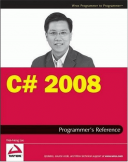Книга: C# 2008 Programmer
Using the default Keyword in Generics
Using the default Keyword in Generics
In the preceding implementation of the generic MyStack class, the Pop() method throws an exception whenever you call it when the stack is empty:
public T Pop() {
_pointer--;
if (_pointer < 0) {
throw new Exception("Stack is empty.");
}
return _elements[_pointer];
}
Rather than throwing an exception, you might want to return the default value of the type used in the class. If the stack is dealing with int values, it should return 0; if the stack is dealing with string, it should return an empty string. In this case, you can use the default keyword to return the default value of a type:
public T Pop() {
_pointer--;
if (_pointer < 0) {
return default(T);
}
return _elements[_pointer];
}
For instance, if the stack deals with int values, calling the Pop() method on an empty stack will return 0:
MyStack<int> stack = new MyStack<int>(3);
stack.Push(1);
stack.Push(2);
stack.Push(3);
Console.WriteLine(stack.Pop()); //---3---
Console.WriteLine(stack.Pop()); //---2---
Console.WriteLine(stack.Pop()); //---1---
Console.WriteLine(stack.Pop()); //---0---
Likewise, if the stack deals with the string type, calling Pop() on an empty stack will return an empty string:
MyStack<string> stack = new MyStack<string>(3);
stack.Push("A");
stack.Push("B");
stack.Push("C");
Console.WriteLine(stack.Pop()); //---"C"---
Console.WriteLine(stack.Pop()); //---"B"---
Console.WriteLine(stack.Pop()); //---"A"---
Console.WriteLine(stack.Pop()); //---""---
The default keyword returns null for reference types (that is, if T is a reference type) and 0 for numeric types. If the type is a struct, it will return each member of the struct initialized to 0 (for numeric types) or null (for reference types).
- Understanding Generics
- Advantages of Generics
- 4.4.4 The Dispatcher
- About the author
- Chapter 7. The state machine
- Appendix E. Other resources and links
- Caveats using NAT
- Example NAT machine in theory
- Using Double Quotes to Resolve Variables in Strings with Embedded Spaces
- The final stage of our NAT machine
- Compiling the user-land applications
- The conntrack entries




